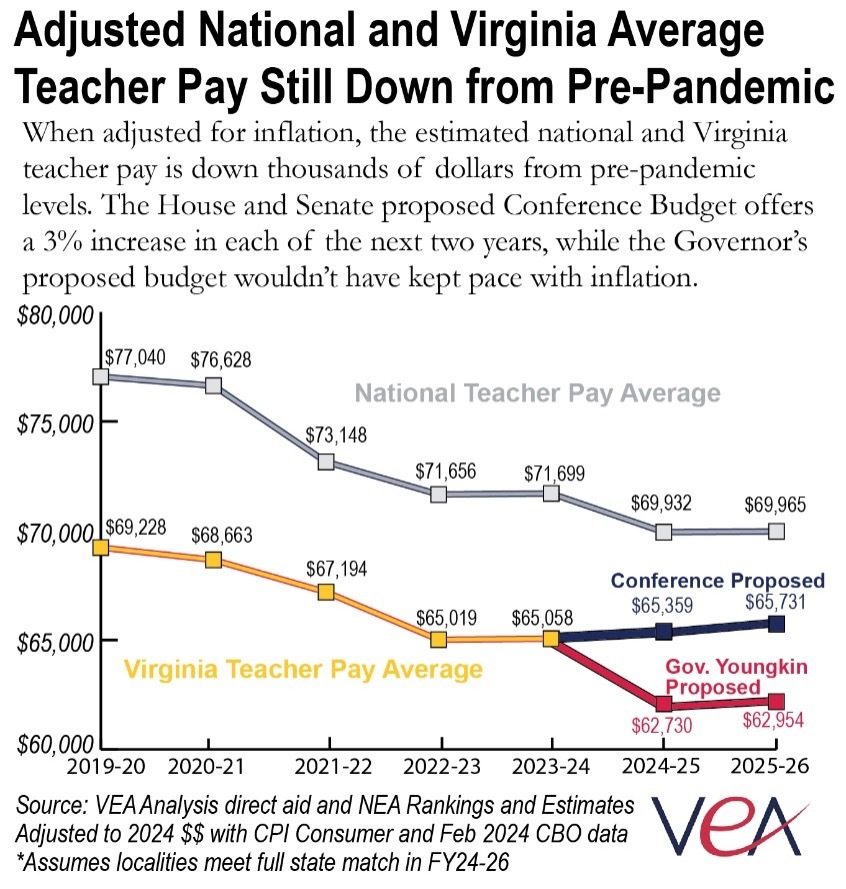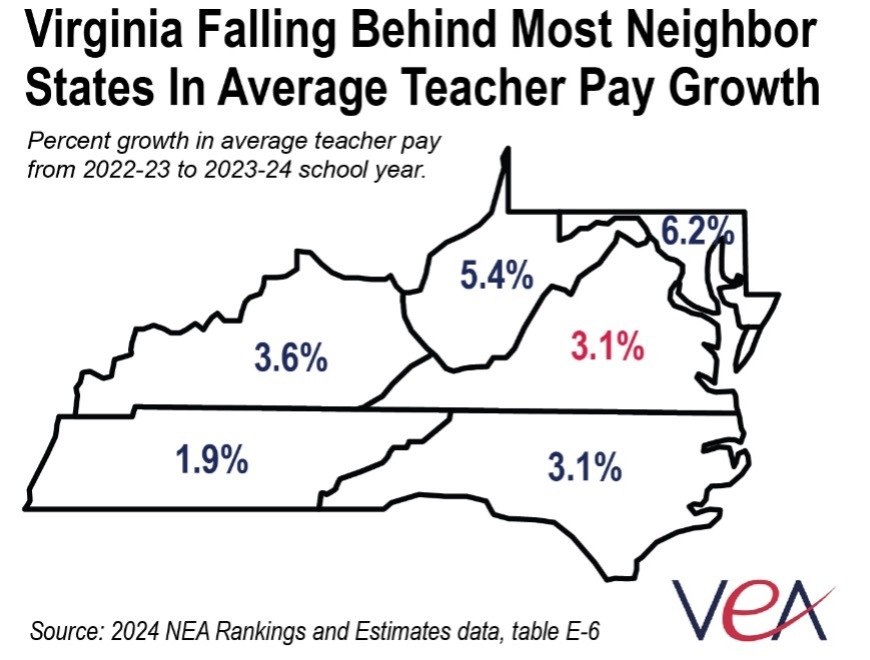New Report Confirms Virginia Again Falls Further Behind the Nation on Teacher Pay
April 30, 2024
April 30, 2024
Since Governor Youngkin took office, Virginia’s average teacher pay has not only failed to keep up with national growth, it hasn’t yet recovered to inflation-adjusted pre-pandemic levels, according to a new National Education Association (NEA) released today. Our teachers are falling further behind: Last year, Virginia’s average teacher pay was $63,103, which was $6,441 below the national average. This year, the gap widens as Virginia’s average teacher pay is estimated to be $65,058, putting our classroom teachers $6,641 below the estimated national average.
“Unfortunately, this report finds Virginia once again fell further behind the national teacher pay average in the most recent year. There’s no reason for a state as wealthy as Virginia to let this happen. Other states had significant budget surpluses due to high inflation over the past two years, and on average they choose to go further investing in education,” said Dr. James J. Fedderman, president of the Virginia Education Association. “The teaching profession is at a crossroads in Virginia, and unless we commit to taking bold action to change course, a new generation of students in our state will grow up with more substitutes and untrained teachers at the front of their classrooms. All students deserve a fully trained and qualified teacher in each of their classes. The stakes couldn’t be much higher for the future of our commonwealth.”

The salary numbers come from NEA’s annual Rankings & Estimates report, which is used by both Virginia and the federal government to compare state and national level average teacher pay. In addition, state data shows that while most states saw an improvement in teacher vacancy rates last year, Virginia stayed stagnant at its record 3.9% rate. Further, analysis by the Economic Policy Institute shows Virginia has the third least competitive teacher pay in the country when compared to other fields that require a similar level of education. Without sustained and substantially scaled investment in competitive teacher pay, Virginia is on a trajectory to have even more qualified educators leave the profession or state in the near future.
While the state is providing funding for its share of an average 6% pay raise over the current school year, Virginia average teacher salaries only increased by about half of that amount over the past year. This mismatch is happening because Virginia continues to see a rapid exodus of some of its most experienced and talented teachers and simultaneously there has been a surge in provisionally licensed teachers who need no background in the field. Provisionally licensed teachers do not have to be placed on the teacher pay scale or qualify for contract protections or retirement benefits. A major recent teacher pipeline report from JLARC, the legislature’s independent research department found: “46 percent of school divisions surveyed by JLARC (sidebar) reported that provisionally licensed teachers are very poorly or poorly prepared to be teachers, while only 3 percent of school divisions reported poor preparation among individuals who attended traditional higher education preparation programs.” Students of color and students living in households experiencing poverty are significantly more likely to be taught by these underqualified teachers than students from higher-income and less diverse schools.

It is a codified goal of the Commonwealth to compensate its public school teachers at a competitive rate in order to attract and retain highly-qualified teachers. Since 2017, “competitive” has been defined in Code as, “at a minimum, at or above the national average teacher salary.” Governor Youngkin has two bills on his desk right now passed by a bipartisan super-majority in each chamber of the General Assembly that could strengthen this commitment and set Virginia on a path to reach the national teacher pay average by the 2027-28 school year – identical bills HB187 and SB104. Virginia continues to be thousands of dollars below the national average in the most recent official rankings, moving from a state/DC rank of 22nd to 24th between the 2021-22 to 2022-23 school years.
“It is imperative that lawmakers come to a compromise to finish the state budget,” said Fedderman. “And they must ensure that the final budget includes the state’s share of the full 3% increase that the House and Senate agreed is needed to prevent us from falling even further behind on competitive pay over the next two years.”
Virginia is a top 10 state in median household income, but ranks 36th in the US in state per pupil funding of K-12 education.
Learn More